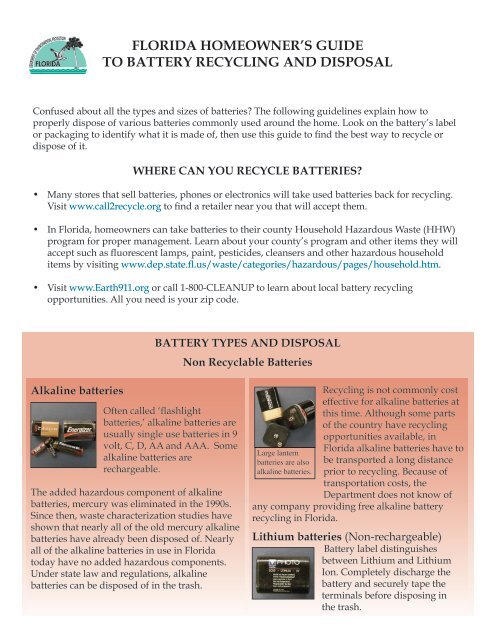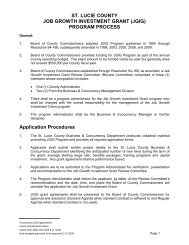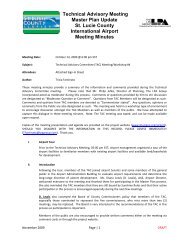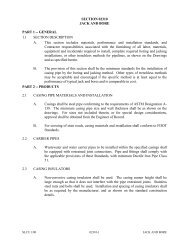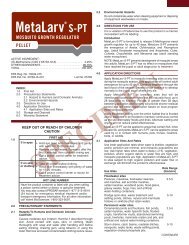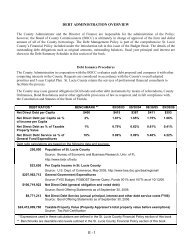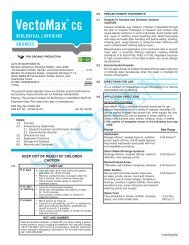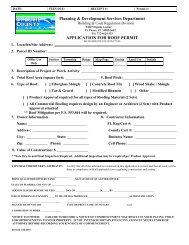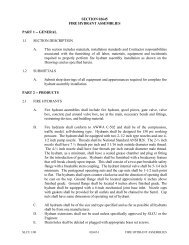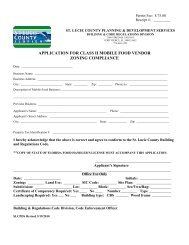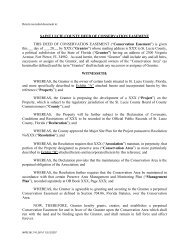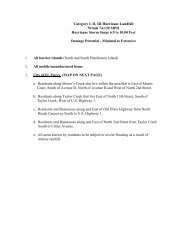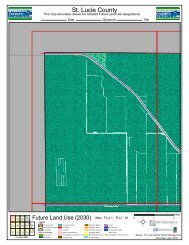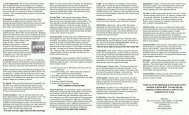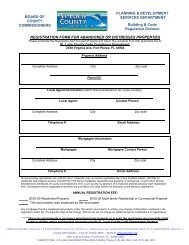florida homeowner's guide to battery recycling and disposal
florida homeowner's guide to battery recycling and disposal
florida homeowner's guide to battery recycling and disposal
You also want an ePaper? Increase the reach of your titles
YUMPU automatically turns print PDFs into web optimized ePapers that Google loves.
FLORIDA HOMEOWNER’S GUIDE<br />
TO BATTERY RECYCLING AND DISPOSAL<br />
Confused about all the types <strong>and</strong> sizes of batteries? The following <strong>guide</strong>lines explain how <strong>to</strong><br />
properly dispose of various batteries commonly used around the home. Look on the <strong>battery</strong>’s label<br />
or packaging <strong>to</strong> identify what it is made of, then use this <strong>guide</strong> <strong>to</strong> find the best way <strong>to</strong> recycle or<br />
dispose of it.<br />
WHERE CAN YOU RECYCLE BATTERIES?<br />
• Many s<strong>to</strong>res that sell batteries, phones or electronics will take used batteries back for <strong>recycling</strong>.<br />
Visit www.call2recycle.org <strong>to</strong> find a retailer near you that will accept them.<br />
• In Florida, homeowners can take batteries <strong>to</strong> their county Household Hazardous Waste (HHW)<br />
program for proper management. Learn about your county’s program <strong>and</strong> other items they will<br />
accept such as fluorescent lamps, paint, pesticides, cleansers <strong>and</strong> other hazardous household<br />
items by visiting www.dep.state.fl.us/waste/categories/hazardous/pages/household.htm.<br />
• Visit www.Earth911.org or call 1-800-CLEANUP <strong>to</strong> learn about local <strong>battery</strong> <strong>recycling</strong><br />
opportunities. All you need is your zip code.<br />
BATTERY TYPES AND DISPOSAL<br />
Non Recyclable Batteries<br />
Alkaline batteries<br />
Often called ‘flashlight<br />
batteries,’ alkaline batteries are<br />
usually single use batteries in 9<br />
volt, C, D, AA <strong>and</strong> AAA. Some<br />
alkaline batteries are<br />
rechargeable.<br />
The added hazardous component of alkaline<br />
batteries, mercury was eliminated in the 1990s.<br />
Since then, waste characterization studies have<br />
shown that nearly all of the old mercury alkaline<br />
batteries have already been disposed of. Nearly<br />
all of the alkaline batteries in use in Florida<br />
<strong>to</strong>day have no added hazardous components.<br />
Under state law <strong>and</strong> regulations, alkaline<br />
batteries can be disposed of in the trash.<br />
Large lantern<br />
batteries are also<br />
alkaline batteries.<br />
Recycling is not commonly cost<br />
effective for alkaline batteries at<br />
this time. Although some parts<br />
of the country have <strong>recycling</strong><br />
opportunities available, in<br />
Florida alkaline batteries have <strong>to</strong><br />
be transported a long distance<br />
prior <strong>to</strong> <strong>recycling</strong>. Because of<br />
transportation costs, the<br />
Department does not know of<br />
any company providing free alkaline <strong>battery</strong><br />
<strong>recycling</strong> in Florida.<br />
Lithium batteries (Non-rechargeable)<br />
Battery label distinguishes<br />
between Lithium <strong>and</strong> Lithium<br />
Ion. Completely discharge the<br />
<strong>battery</strong> <strong>and</strong> securely tape the<br />
terminals before disposing in<br />
the trash.
Recyclable Batteries<br />
Lithium Ion batteries<br />
(LI-ion) (rechargeable)<br />
Uses: lap<strong>to</strong>ps, other small<br />
electronics.<br />
But<strong>to</strong>n batteries<br />
Uses: hearing aids,<br />
watches, calcula<strong>to</strong>rs.<br />
Small Sealed Lead<br />
Acid (SSLA) batteries<br />
Uses: smaller equipment<br />
<strong>and</strong> backup power<br />
supplies. Rechargeable<br />
Battery Recycling<br />
Corporation (RBRC),<br />
which provides the<br />
required <strong>recycling</strong> for<br />
most <strong>battery</strong> manufacturers, accepts SSLA<br />
batteries weighing up <strong>to</strong> 11 pounds.<br />
Wet Cell Lead Acid<br />
batteries<br />
Uses: au<strong>to</strong>s, boats, trucks.<br />
Retailers are required <strong>to</strong><br />
take back for <strong>recycling</strong> as<br />
trade-ins for new batteries.<br />
Portable power <strong>to</strong>ol<br />
batteries<br />
Uses: any br<strong>and</strong> of<br />
portable, cordless power<br />
<strong>to</strong>ol.<br />
Old-style cell phone<br />
batteries<br />
Cell phones should also be<br />
recycled. Take <strong>to</strong> HHW or<br />
check for other <strong>recycling</strong><br />
opportunities at local<br />
retailers.<br />
Nickel-Cadmium<br />
batteries (NiCd)<br />
Uses: portable electronics<br />
<strong>and</strong> <strong>to</strong>ys.<br />
Nickel Metal Hydride<br />
batteries (NiMH)<br />
Uses: consumer electronics.<br />
Battery Pack<br />
These batteries are<br />
packaged <strong>to</strong>gether with<br />
one single connec<strong>to</strong>r. Uses:<br />
phones, small equipment.<br />
For more information, please contact the Florida<br />
Department of Environmental Protection at<br />
(850)245-8705 or visit www.dep.state.fl.us.<br />
These pho<strong>to</strong>s represent some of the types of batteries<br />
that consumers use <strong>and</strong> are not a complete list of<br />
available <strong>battery</strong> types or manufacturers. Inclusion or<br />
absence from the examples does not imply prejudice<br />
or impropriety. The DEP does not endorse specific<br />
equipment or companies.


